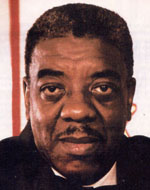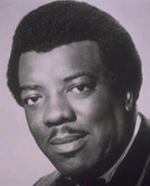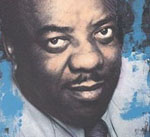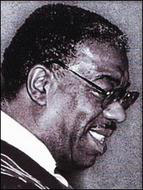 Born
in Chicago, Rev. Cleveland
began singing as a boy soprano at Pilgrim Baptist Church,
where Thomas A. Dorsey was
minister of music and Roberta Martin was
pianist for the choir. He strained his vocal cords as a teenager while part of a
local gospel group, leaving the distinctive gravelly voice that was his hallmark
in his later years. The change in his voice led him to focus on his skills as a
pianist and later as a composer and arranger. For his pioneering accomplishments
and contributions, he is regarded by many to be one of the greatest gospel
singers to ever live.
Born
in Chicago, Rev. Cleveland
began singing as a boy soprano at Pilgrim Baptist Church,
where Thomas A. Dorsey was
minister of music and Roberta Martin was
pianist for the choir. He strained his vocal cords as a teenager while part of a
local gospel group, leaving the distinctive gravelly voice that was his hallmark
in his later years. The change in his voice led him to focus on his skills as a
pianist and later as a composer and arranger. For his pioneering accomplishments
and contributions, he is regarded by many to be one of the greatest gospel
singers to ever live.
In 1950, Cleveland joined the
Gospelaires, a trio led by Norsalus McKissick and Bessie Folk, who were associated with Martin. Martin hired him as
a composer and arranger after the group disbanded. His arrangements of songs
such as "(Give Me That) Old Time Religion" and "It's Me O Lord" transformed
them, giving a rocking lilt and insistent drive to old standards.
McKissick and Bessie Folk, who were associated with Martin. Martin hired him as
a composer and arranger after the group disbanded. His arrangements of songs
such as "(Give Me That) Old Time Religion" and "It's Me O Lord" transformed
them, giving a rocking lilt and insistent drive to old standards.
Cleveland subsequently went to
work for Albertina Walker (Queen
of Gospel) & the Caravans as a
composer, arranger, pianist and occasional singer/narrator. Albertina Walker
provided James the opportunity to do his very first recording after convincing
her record company (by staying out of the studio for a while) to allow her to
record James. He quit and returned to the Caravans a number of times to join
other groups, such as the Gospel All-Stars and the Gospel Chimes, where he mixed
pop ballad influences with traditional shouting. In 1959 he recorded a version
of Ray Charles'
hit "Hallelujah I Love Her So" as a solo artist.
 He became known by more than
just the professionals within gospel music with his version of the Soul Stirrers' song,
"The Love of God", backed by the Voices of Tabernacle from Detroit. Cleveland
attained even greater popularity working with keyboardist Billy Preston and the
Angelic Choir of Nutley, New Jersey; his recording of "Peace Be Still", an
obscure 18th century madrigal,
sold hundreds of thousands of copies thanks to Cleveland's comforting growl and
emotional command.
He became known by more than
just the professionals within gospel music with his version of the Soul Stirrers' song,
"The Love of God", backed by the Voices of Tabernacle from Detroit. Cleveland
attained even greater popularity working with keyboardist Billy Preston and the
Angelic Choir of Nutley, New Jersey; his recording of "Peace Be Still", an
obscure 18th century madrigal,
sold hundreds of thousands of copies thanks to Cleveland's comforting growl and
emotional command.
Cleveland capitalized on his
success by founding his own choir, the Southern California Community Choir, as
well as a church that went from a handful of congregants to thousands of members
during his life. His influence stretched even further: like Dorsey before him,
he taught others how to achieve the modern gospel sound through his annual
Gospel Singers Workshop Convention, put on by the Gospel Music Workshop of America
("GMWA"), an organization that Cleveland founded along with Albertina Walker, and
which has over 30,000 members in 150 chapters. The GMWA has produced, among
others, John P. Kee.
of members
during his life. His influence stretched even further: like Dorsey before him,
he taught others how to achieve the modern gospel sound through his annual
Gospel Singers Workshop Convention, put on by the Gospel Music Workshop of America
("GMWA"), an organization that Cleveland founded along with Albertina Walker, and
which has over 30,000 members in 150 chapters. The GMWA has produced, among
others, John P. Kee.
The style he pioneered — large
disciplined organizations who used complex arrangements and unusual time
signatures to turn their massive vocal power to achieve the propulsive rhythms,
intricate harmonies and individual virtuosity of the greatest groups of gospel's
Golden Age — was still the wellspring for the mass choirs of that era.
Rev. Cleveland died in 1991 in Culver City, California.
Trivia
- James Cleveland was the first gospel
artist ever to receive a star on the Hollywood Walk of Fame.
- Rev. Cleveland was awarded an
honorary doctorate degree from Trinity Bible College.
- David and Delores Winans, matriarch
and patriarch of the famous Winans family, met
while in the Lucille Lemon Choir, conducted by James Cleveland.
-
Aretha Franklin
was among the many people who learned from James Cleveland.
- Cleveland's voice was sampled and
reworked for the gospel song "One Sunday Morning" by
Tonéx.
- He and his choir appear on the song
"Where's the Shoorah?" from Elton John's 1976 album
Blue Moves.
- His choir, the Southern California
Community Choir, appears in the movie
The Blues Brothers,
as the choir backing James Brown (a.k.a. Rev. Cleophus James, the Triple Rock
Baptist Church preacher), in a gospel called "The Old Landmark" (1980).
Awards
- Grammy Award won for Best Gospel Album
By A Choir Or Chorus 1990:
The Southern California Community Choir: Having Church
- Grammy Award won for Best Soul Gospel
Performance, Traditional 1980:
James Cleveland & The Charles Fold Singers: Lord, Let Me Be An Instrument
- Grammy Award won for Best Soul Gospel
Performance, Traditional 1977:
James Cleveland: James Cleveland Live At Carnegie Hall
- Grammy Award won for Best Soul Gospel
Performance 1974:
James Cleveland & The Southern California Community Choir: In The Ghetto